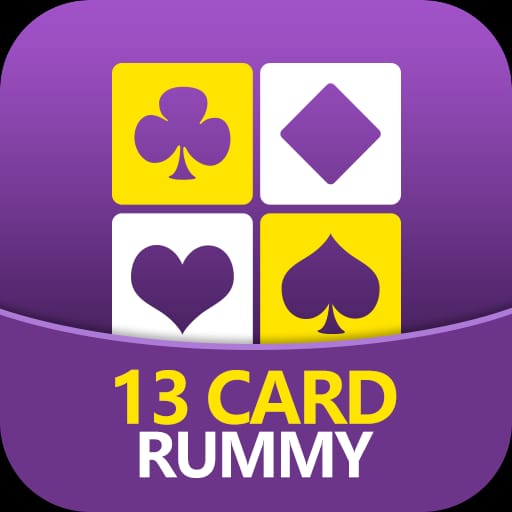13 Cards Rummy, also known as Indian Rummy, is a variant of the classic rummy game that is widely played in India and across the globe. It is played with a standard deck of 52 cards and is designed for 2 to 6 players. The objective of the game is to arrange all 13 cards into valid sets and sequences, also known as melds, where a sequence is a group of consecutive cards of the same suit, and a set is a group of cards with the same rank but different suits.
Rules of 13 Cards Rummy
- Deck and Players: The game is played with one standard deck of 52 cards. Each player is dealt 13 cards at the beginning of the game.
- Jokers: Typically, two types of jokers are used in 13 Cards Rummy: printed jokers (randomly selected at the beginning) and wild jokers (any card of the same rank as the printed joker in any suit).
- Objective: Players aim to arrange their 13 cards into valid sets and sequences. A valid declaration consists of at least two sequences, including one pure sequence (a sequence without a joker) and one impure sequence (a sequence that can include a joker).
- Turn of Play: The game proceeds in turns, where each player draws a card from the deck or the discard pile and then discards one card to maintain 13 cards in hand. The goal is to form the required sequences and sets as quickly as possible.
- Scoring: Points are assigned based on the cards that remain in the hand of the losing player at the end of each round. Face cards (Jack, Queen, King, Ace) carry 10 points each, and numbered cards carry points equal to their face value. The objective is to minimize points and maximize winning opportunities.
Strategies for Success in 13 Cards Rummy
- Focus on Pure Sequence: Prioritize forming a pure sequence early in the game, as it is a mandatory requirement for a valid declaration. This sequence cannot include any jokers.
- Utilize Jokers Wisely: Use jokers strategically to complete impure sequences and sets. They can be substituted for any missing card to form a valid meld.
- Observe Opponents: Pay attention to the cards picked and discarded by your opponents. This can give you clues about their potential sequences and help you decide which cards to hold or discard.
- Manage Discards Carefully: Be mindful of the cards you discard, as they could benefit your opponents. Discard high-value cards early to minimize points if you anticipate not forming a sequence with them.
- Stay Flexible: Adapt your strategy based on the cards you receive and the progress of the game. Flexibility and quick decision-making are key to success in 13 Cards Rummy.
Benefits and Appeal of 13 Cards Rummy
- Skill-Based Game: 13 Cards Rummy is a game of skill that rewards strategic thinking, observation, and decision-making abilities.
- Social Interaction: It provides an opportunity for social interaction, whether playing with friends and family or competing in online tournaments.
- Accessibility: The game can be played both offline and online, with various platforms offering digital versions that are accessible anytime and anywhere.
- Cognitive Benefits: Playing 13 Cards Rummy can improve cognitive skills such as memory, concentration, and logical reasoning.
- Entertainment Value: Above all, 13 Cards Rummy offers entertainment and excitement, making it a favorite pastime for players of all ages.
Conclusion
13 Cards Rummy continues to charm card game enthusiasts with its blend of skill, strategy, and entertainment. Whether you are a seasoned player or new to the game, mastering the rules and strategies outlined above will enhance your enjoyment and chances of success. Embrace the challenge, sharpen your skills, and experience the timeless appeal of 13 Cards Rummy today!




